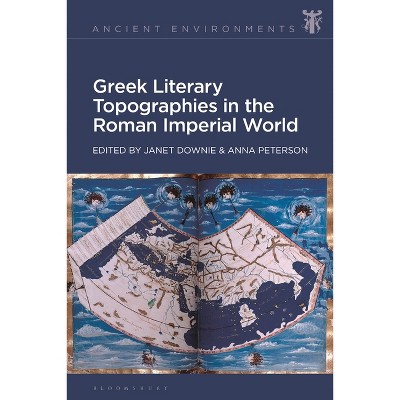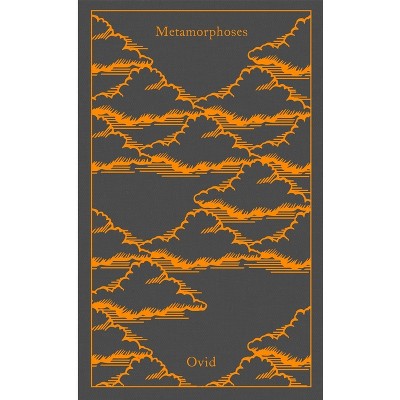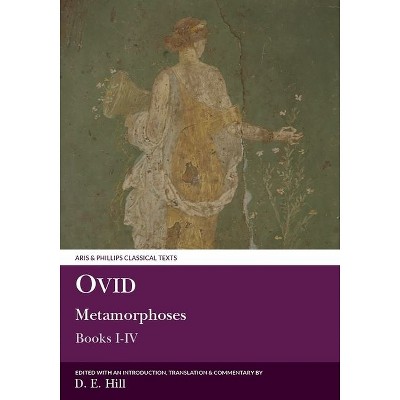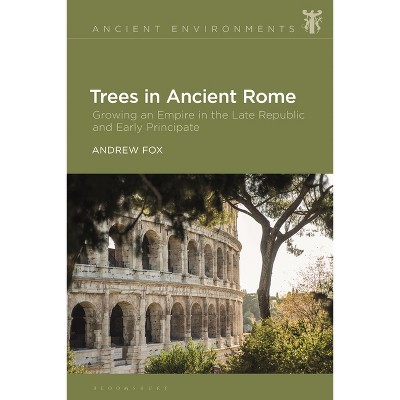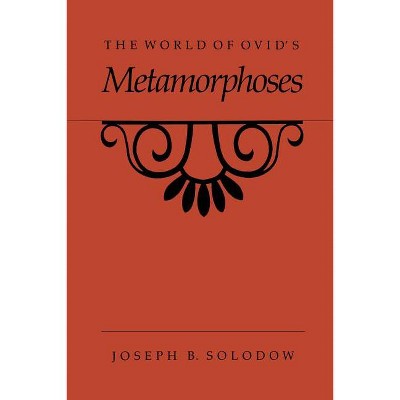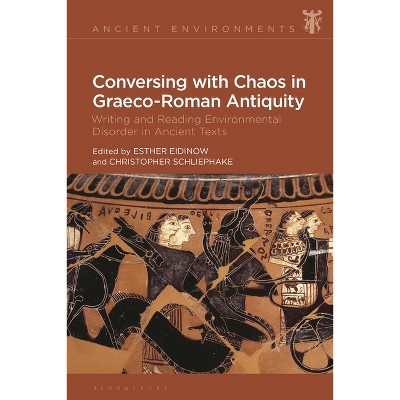Ovid's Metamorphoses and the Environmental Imagination - (Ancient Environments) by Giulia Sissa & Francesca Martelli (Paperback)

$39.99 when purchased online
Target Online store #3991
About this item
Highlights
- This book positions Ovid's Metamorphosesas a foundational text in the western history of environmental thought.
- About the Author: Giulia Sissa is Distinguished Professor of Political Science, Comparative Literature and Classics at UCLA, USA.
- 264 Pages
- Poetry, Ancient & Classical
- Series Name: Ancient Environments
Description
About the Book
"Ovid's Metamorphoses offers a compelling site for reconsidering the category of the human within the complex ecologies that make up the world as we know it. The poem's recurrent theme is the physical transformation of humans into other life forms, a theme that invites readers to consider how human and non-human agencies have evolved from and adapted to one another in a relationship characterized by fluctuating perceptions of friction and symbiosis, distance and proximity. This volume of essays traces the variety of ways in which the world of the Metamorphoses offers a set of structures for modelling the relationship between humans and other agencies within the biosphere in ways that answer to many of the precepts of contemporary eco-criticism. The contributors make the case for seeing the worldview depicted in this ancient text as an exemplar of the 'premodern' ecological mindset that contemporary environmental thought seeks to approximate in many ways. Their papers also scrutinize a number of critical moments in the history of the text's ecological reception (including reflections by a contemporary poet, as well as studies of important Medieval and Renaissance receptions of Ovid) in an attempt to recuperate the Metamorphoses as a foundational text in the history of environmental thought"--Book Synopsis
This book positions Ovid's Metamorphosesas a foundational text in the western history of environmental thought. The poem is about new bodies. Stones, springs, plants and animals materialize out of human origins to create a world of hybrid objects, which retain varying degrees of human subjectivity while taking on new physical form. In bending the boundaries of known categories of being, these hybrid entities reveal both the porousness of human and other agencies as well as the dangers released by their fusion. Metamorphosis unsettles the category of the human within the complex ecologies that make up the world as we know it.Drawing on a range of modern environmental theorists and approaches, the contributors to this volume trace how the Metamorphoses models the relationship between humans and other life forms in ways that resonate with the preoccupations of contemporary eco-criticism. They make the case for seeing the worldview depicted in Ovid's poem as an exemplar of the 'premodern' ecological mindset that contemporary environmental thought seeks to approximate. They also highlight critical moments in the history of the poem's ecological reception, including reflections by a contemporary poet, as well as studies of Medieval and Renaissance responses to Ovid.
Review Quotes
Ovid's "environment" is a very obvious and at the same time an extremely complicated topic. "Ovid's Metamorphoses and the Environmental Imagination" interrogates the Ovidian text with new questions, which encourage us to rethink the role of the non-human world in the Metamorphoses and beyond.
About the Author
Giulia Sissa is Distinguished Professor of Political Science, Comparative Literature and Classics at UCLA, USA. She is the author of The Daily Life of the Greek Gods (with M. Detienne, 2000), Greek Virginity (1990), Sex and Sensuality in the Ancient World (2008), Jealousy: A Forbidden Passion (2017) and Le Pouvoir des femmes. Un défi pour la démocratie (2021).
Francesca Martelli is Associate Professor of Classics at UCLA, USA. She is the author of Ovid (2020) and Ovid's Revisions (2013).Dimensions (Overall): 9.21 Inches (H) x 6.14 Inches (W) x .55 Inches (D)
Weight: .82 Pounds
Suggested Age: 22 Years and Up
Number of Pages: 264
Genre: Poetry
Sub-Genre: Ancient & Classical
Series Title: Ancient Environments
Publisher: Bloomsbury Academic
Format: Paperback
Author: Giulia Sissa & Francesca Martelli
Language: English
Street Date: February 20, 2025
TCIN: 1002062511
UPC: 9781350268982
Item Number (DPCI): 247-23-2593
Origin: Made in the USA or Imported
If the item details aren’t accurate or complete, we want to know about it.
Shipping details
Estimated ship dimensions: 0.55 inches length x 6.14 inches width x 9.21 inches height
Estimated ship weight: 0.82 pounds
We regret that this item cannot be shipped to PO Boxes.
This item cannot be shipped to the following locations: American Samoa (see also separate entry under AS), Guam (see also separate entry under GU), Northern Mariana Islands, Puerto Rico (see also separate entry under PR), United States Minor Outlying Islands, Virgin Islands, U.S., APO/FPO
Return details
This item can be returned to any Target store or Target.com.
This item must be returned within 90 days of the date it was purchased in store, shipped, delivered by a Shipt shopper, or made ready for pickup.
See the return policy for complete information.
Frequently bought together

$16.99
MSRP $24.00
Buy 2, get 1 free select books, movies, music & Funko
5 out of 5 stars with 2 ratings
Trending Poetry

Bestseller
$24.48
MSRP $35.00
Buy 2, get 1 free select books, movies, music & Funko
4.8 out of 5 stars with 24 ratings

Bestseller
$14.39
Buy 2, get 1 free select books, movies, music & Funko
3.8 out of 5 stars with 62 ratings

$22.80
was $26.60 New lower price
Buy 2, get 1 free select books, movies, music & Funko
5 out of 5 stars with 4 ratings

Highly rated
$9.85 - $23.09
MSRP $15.99 - $32.99
Buy 2, get 1 free select books, movies, music & Funko
4.8 out of 5 stars with 137 ratings

$23.09
Buy 2, get 1 free select books, movies, music & Funko
3.8 out of 5 stars with 13 ratings

$23.09
Buy 2, get 1 free select books, movies, music & Funko
4.4 out of 5 stars with 11 ratings
